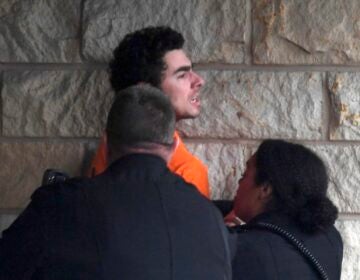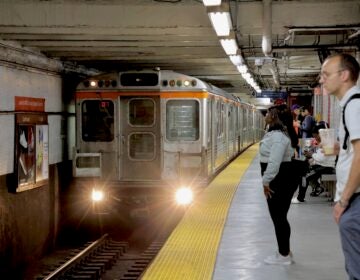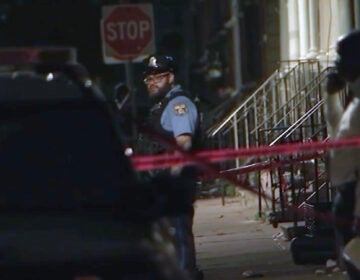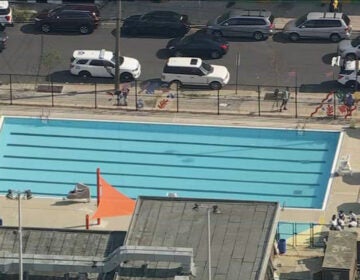McDonald’s employee in Altoona who called 911 in CEO’s shooting is eligible for a reward, but it will take time
Up to $60,000 in rewards from the FBI and the Crime Stoppers program had been offered to anyone calling in a tip leading to a break in the case.

A reward poster hangs on a light pole outside the Hilton Hotel in midtown Manhattan where Brian Thompson, the CEO of UnitedHealthcare, was fatally shot ,Wednesday, Dec. 4, 2024, in New York. (AP Photo/Stefan Jeremiah)
UnitedHealthCare CEO shooting: What to know
- Luigi Mangione is accused of murdering UnitedHealthcare CEO Brian Thompson. The 26-year-old is a University of Pennsylvania graduate
- Here’s what we know about Mangione’s life, plus key details about the case
- Thompson was likely killed with a ghost gun that can be made at home. Here’s a look at the weapons and efforts to regulate them
- Words on ammo used in the shooting echo a common phrase on insurer tactics: Delay, deny, defend
- Arguments over whether Mangione is a “hero” offer a glimpse into an unusual American moment
More than 400 tips were called into the New York Police Department’s Crime Stoppers tip line during the five-day search for a masked gunman who ambushed and fatally shot UnitedHealthcare CEO Brian Thompson last week.
NYPD officials said about 30 of those tips were useful as information about the gunman’s movements before and after the Dec. 4 shooting began to take shape. But it wasn’t until a 911 call came in from a McDonald’s employee in Altoona, Pennsylvania, on Monday that police zeroed in on their suspect.
Up to $60,000 in rewards from the FBI and the Crime Stoppers program had been offered to anyone calling in a tip leading to a break in the case. But although police and prosecutors moved quickly to arrest and charge 26-year-old Luigi Mangione, any rewards may take significantly more time to be released and might be less than the full amount after taxes and consideration of the role the tips played.
Exactly who will get a reward or a share of one is still being determined, officials said. In fact, the federal and local rewards programs operate with different rules, but both have leeway built in to offer multiple rewards of varying amounts based on the outcome of those tips.
How does someone become eligible for a reward?
The FBI reward program, which offered a reward of up to $50,000 in this case, requires that a tip or information lead to an arrest and conviction.
Phone calls and emails to the FBI press office seeking details of the specific reward program’s process were not returned, but websites for various rewards offered by the agency outline similar processes. A person giving a tip must be nominated, usually by a federal investigating agency. Then a board considers the tip and its role in the investigation, and decides whether to award up to the full amount.
For the NYPD Crime Stoppers award, funded by the New York City Police Foundation and the NYPD’s Detective Bureau, the tip line usually offers up to $3,500 for information that leads to an arrest and indictment. The Detective Bureau increased that amount to $10,000 in this case, and for its portion a conviction is required.
“The public’s help is essential to solving crimes and keeping our communities safe,” the Police Foundation board said in a statement Wednesday. “The individual in Pennsylvania, who called in a tip, is eligible to receive the reward.”
The McDonald’s employee called 911, which records a number and usually a name. A tipster calling the Crime Stoppers line remains anonymous. The program promises to never trace cellphone numbers or record information about the callers, instead giving them a unique identifier number that they can use to check back about the status of the case and the potential for a reward.
NYPD Chief of Detectives Joseph Kenny will assess which tip or tips were instrumental in cracking the case when determining how Detective Bureau reward funds should be allocated, police officials said Wednesday.
When might money be awarded?
Most rewards require a conviction. Given the nature of the murder charges and the multiple jurisdictions involved, it could be a year or more before a trial happens.
For the $3,500 from Crime Stoppers, the board could decide to issue reward money after the indictment is complete. Both the FBI and Crime Stoppers have boards that review the tips, talk to detectives or other law enforcement involved in the investigation, and determine which tips served a substantial role in the case. The boards have some leeway to decide the amounts each tip would merit.
The Crime Stoppers board has the leeway to split a reward between tips or to consider each for the maximum amount on a case-by-case basis.
NYPD officials did not specify how any of the 30 tips helped the case, but it’s unlikely each tipster would receive the highest amount offered.
How has money been awarded in the past?
The police foundation and the FBI don’t discuss individual cases or reveal how much money individual tipsters were awarded.
For some programs such as the Rewards for Justice program, the FBI notes that it has awarded millions of dollars over the last two decades. For that program, the FBI sometimes announces the amount of the reward but does not identify the tipsters. Most often, the agency provides a confidential report to Congress detailing the tips and the rewards.
The same principles apply to Crime Stoppers The program doesn’t release details in an effort to protect the anonymity promised to tipsters. It does tout notable cases on its website in which the tips helped solve cases, including an April 2022 mass shooting on the where tips helped lead officials to the arrest and eventual guilty plea of Frank James.
___
Associated Press reporter Michael R. Sisak in New York contributed to this story.

Get daily updates from WHYY News!
WHYY is your source for fact-based, in-depth journalism and information. As a nonprofit organization, we rely on financial support from readers like you. Please give today.





